About
Quick Facts about Acid Reflux
- An estimated 15 million Americans suffer from heartburn.
- Women experience digestive problems, including acid reflux, about twice as much as men do.
- Many women have their first episode of heartburn during pregnancy, usually due to hormonal changes.
Acid reflux is the backflow of acid from the stomach into the esophagus when there is a problem with the valve-like muscle that connects the esophagus to the stomach, called the lower esophageal sphincter (LES). Acid can leave the stomach when the sphincter does not close completely or if it opens when it should not. Various factors can affect the functioning of the sphincter muscle, including hormonal imbalances.
Thus, women are more likely to experience acid reflux during certain stages of reproductive life - puberty, pregnancy, post-partum (including breastfeeding), and menopause - when hormone levels are in a state of flux.
Identifying Acid Reflux
Each woman experiences the sensation of acid washing up into the esophagus differently. For that reason, there are various names associated with this digestive problem. Heartburn, acid reflux, and gastroesophageal reflux disease (GERD) are all terms used when referring to displaced acid in the esophagus and its symptoms.
To learn more about the mechanism of acid reflux, continue on to read about the hormonal and non-hormonal causes.
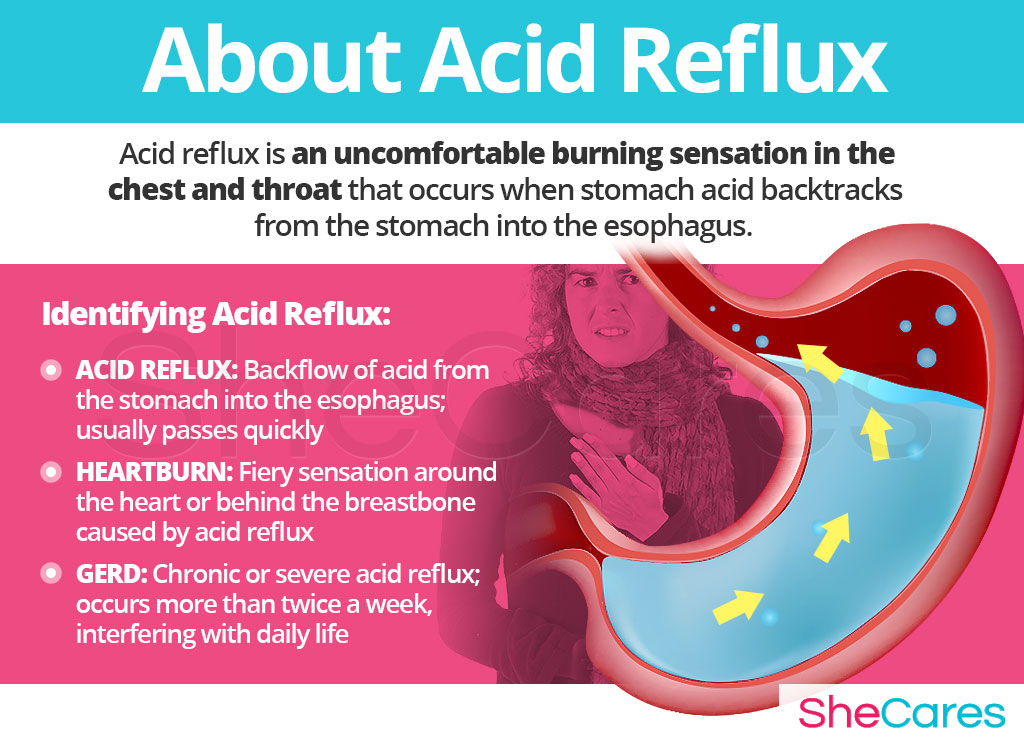
Causes
In order to treat and prevent acid reflux, it is crucial to understand the cause behind it. While many factors can influence the contraction, pressure, and relaxation of the LES, elevated hormone levels are a common cause of sphincter dysfunction resulting in acid reflux. However, other causes may also be behind heartburn, some rarer than others.
Keep reading to find out more about both the hormonal and additional causes of acid reflux.
Hormonal Causes of Acid Reflux
Hormones are the body's chemical messengers, and they regulate and stimulate nearly every process and function in the body. Therefore, an imbalance of hormones can result in uncomfortable symptoms, such as acid reflux.
The lower esophageal sphincter muscle is a smooth muscle, meaning that its movement is not voluntarily controlled. Smooth muscles are also affected by hormones. The female sex hormone progesterone plays an essential role in the relaxation of smooth muscles. Therefore, progesterone can cause the sphincter to relax when it should be contracted, resulting in the backflow of acid, and thus, heartburn.
An excess of progesterone, especially at certain points of the menstrual cycle and during pregnancy, as well as other times of hormonal imbalance, can cause acid reflux, which may worsen and become GERD. Thus, in many cases, it can be said that acid reflux is caused by an imbalance of the hormone progesterone.
In addition, other non-hormonal can affect the appearance of acid reflux at different stages of reproductive life, namely PMS, puberty, pregnancy, post-partum, and menopause.
Hormonal Causes during Different Phases in a Woman's Life
PMS is a group of symptoms related to the hormonal changes that occur before a woman menstruates. It can include various disorders, such as acid reflux.
Puberty is the time in a girl's life when her body starts producing reproductive hormones and developing. These hormonal changes, as well as other factors like changes in diet, may influence acid reflux during puberty.
Pregnancy entails drastic fluctuations in the levels of hormones, which alongside other factors - such as bodily changes - commonly cause acid reflux and other digestive discomforts.
Post-partum, including breastfeeding, is another period of hormonal imbalance, which can sometimes lead to disorders like acid reflux, though it is much more common during pregnancy.
Menopause is the transition in a woman's life from her childbearing to post-childbearing years. During this stage, hormone levels fluctuate and eventually decline, often resulting in uncomfortable symptoms like acid reflux.
Other Less Common Causes of Acid Reflux
Even though hormonal imbalance is the fundamental cause of acid reflux during the various stages of a woman's reproductive life, other less common health conditions may be behind the presence of GERD symptoms. Such disorders include a hiatal hernia and medications that relax the LES.
Continue reading to find out more about the risk factors and triggers that can impact the experience of acid reflux and GERD.
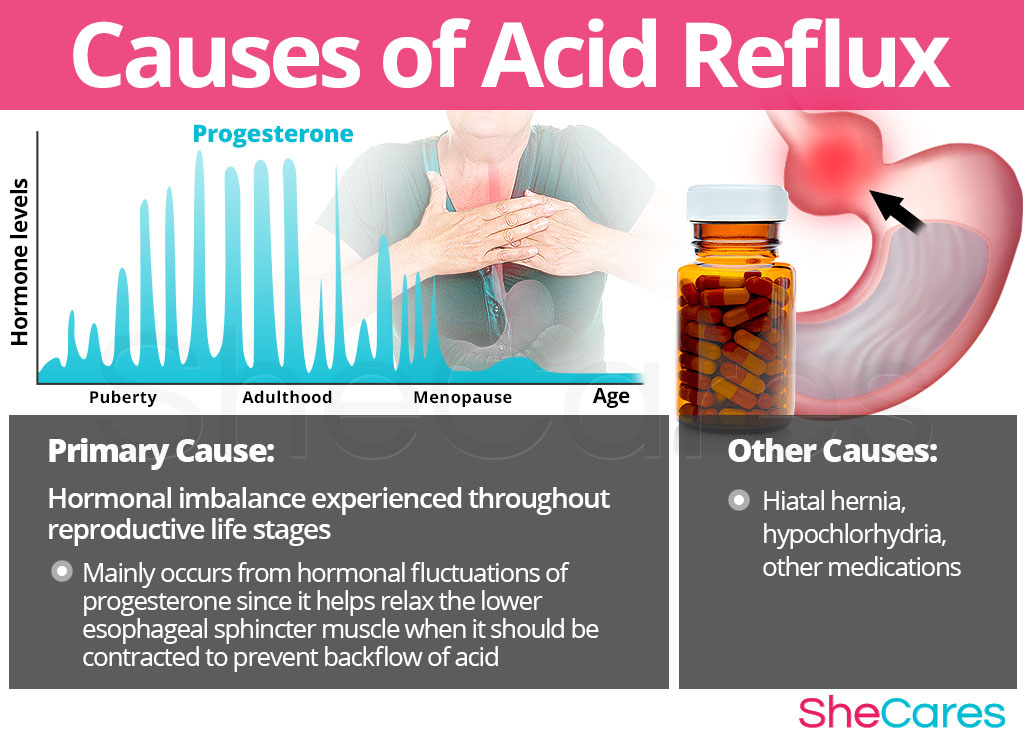
Risk Factors and Triggers
Risk Factors for Acid Reflux
Some women are more likely to experience acid reflux than others because of certain food sensitivities and other factors that vary from individual to individual. Behaviors and habits can also affect a woman's predisposition to acid reflux disease.
Triggers of Acid Reflux
Acid reflux can be triggered by external factors, usually certain foods. The foods that can trigger acid reflux vary from woman to woman depending on individual sensitivities, but some more commonly provoke acid reflux than others do. These include trouble foods like soft drinks and many condiments, just to name a few.
Keep reading to learn about the signs and symptoms of heartburn and GERD in order to pick a treatment related to the cause.
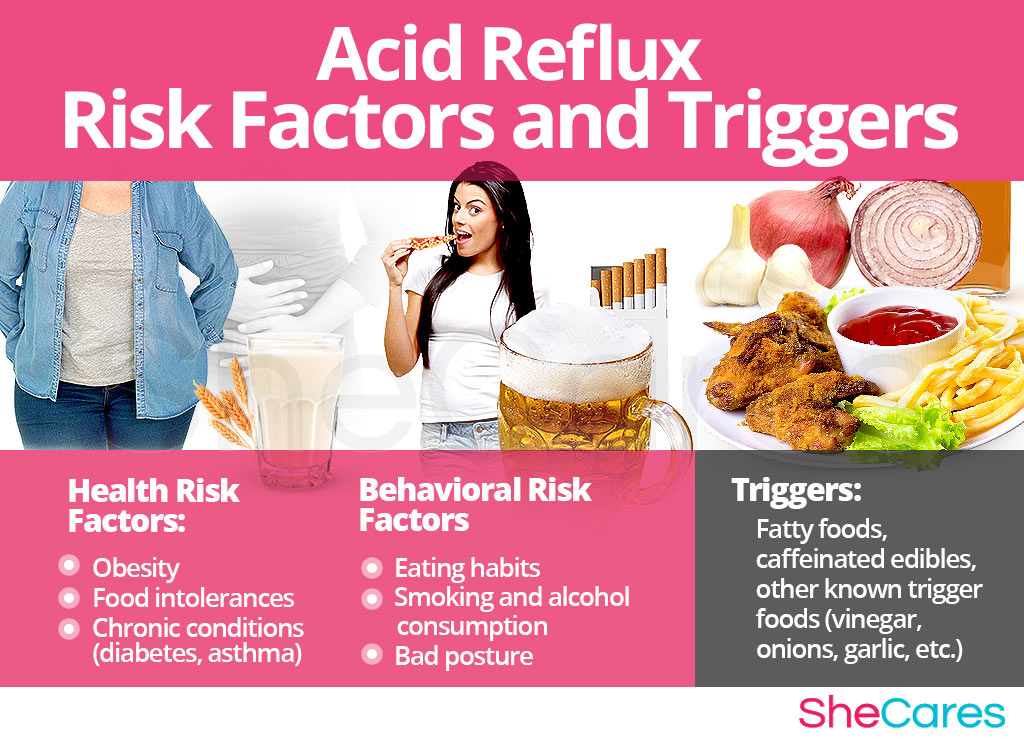
Signs and Symptoms
The symptoms of acid reflux often manifest differently from woman to woman depending on her individual diet and sensitivity to hormonal fluctuations. Nevertheless, there are several symptoms that are commonly experienced as a result of acid reflux episodes.
Common Symptoms of Acid Reflux
- Heartburn (a fiery pain or sensation in the chest)
- Throat irritation
- An acid or sour taste in the back of the mouth or throat
- Bad breath
- Nausea
- Excessive belching
In addition to the above common symptoms, some other symptoms may occur as a result of the backflow of stomach acid, depending on the individual's sensitivity to the acid and any other conditions they may have.
Signs of Acid Reflux
The above symptoms are usually enough to indicate that the LES muscle is not functioning correctly. Any amount of acid entering back up through the esophagus, no matter how small, is a sign of acid reflux.
Acid reflux is a sign of GERD (gastroesophageal reflux disease) when it occurs more than twice a week or when it does not respond to normal treatment.
Diagnosis of Acid Reflux
In order to diagnose acid reflux and its intensity, a doctor or gastroenterologist typically carries out three procedures. First, he or she reviews the patient's medical history, conducts a physical exam, and carries out any tests.
Complications of Acid Reflux
Most people experience acid reflux from time to time in their lives, which is normal and not problematic (aside from the discomfort). So, it does not typically require medical attention. However, frequent episodes of acid reflux (three times or more per week) constitute GERD. While GERD can be considered a complication of acid reflux, it has its own complications as well. In other words, the chronic and repeated backflow of stomach acid can permanently damage the esophagus and lead to other health problems. Therefore, GERD should not be left untreated, or conditions like Barrett's esophagus and breathing problems may result. These complications have specific warning signs, which should not be ignored.
Women may wish to prevent or manage acid reflux if they have GERD (chronic acid reflux) or if they simply experience heartburn during times of hormonal fluctuation or after eating foods they enjoy. Continue reading to learn some practical techniques and habits that can help in preventing and managing acid reflux.
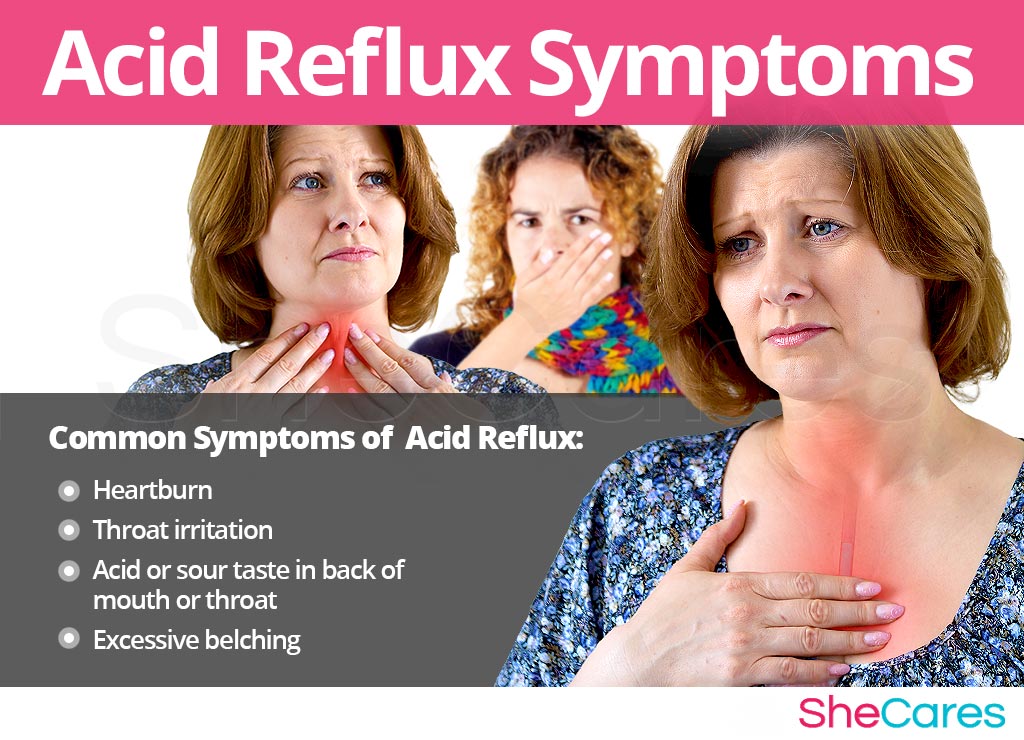
Prevention and Management
Preventing Acid Reflux
There may not be one surefire way to prevent acid reflux entirely, just as there is no way to stave off natural hormonal fluctuations. Nonetheless, there are some precautions a woman can take and habits she can adopt to help prevent acid reflux or to reduce the frequency and intensity of episodes.
Lifestyle adjustments for prevention are crucial, especially in terms of diet, exercise, and healthy habits. Additionally, lifestyle changes can be complemented with vitamin and herbal supplements that help enhance the endocrine system and thereby help prevent or alleviate symptoms of hormonal imbalance, including acid reflux.
For women already experiencing frequent episodes of acid reflux, prevention may no longer be an option. However, there are many ways to manage it in order to decrease the intensity or frequency of symptoms, like heartburn. Keep reading to find out more about managing acid reflux.
Managing Acid Reflux
Whenever a woman is experiencing heartburn or other symptoms of acid reflux, there are effective ways to instantly manage the pain. In addition, some methods help reduce subsequent episodes of acid reflux. Making minor adjustments and avoiding triggers can go a long way.
Managing heartburn is very important in order to prevent GERD and other complications as well to avoid the burning discomfort of acid reflux. There are general tips and tools a woman can apply in managing acid reflux, such as adjusting eating habits and keeping a heartburn journal.
Alternative Management Tips for Acid Reflux
Alternative management methods can help decrease stress and anxiety, thereby reducing the occurrences of acid reflux and heartburn. However, these treatments do not address the hormonal or dietary causes behind many cases of acid reflux or GERD, but they may reduce symptoms short-term. Some alternative management tips are acupuncture, massage, and relaxation therapies.
These methods may help to reduce stress and alleviate acid reflux in the short term, but they do not treat the underlying cause, which is often a hormonal imbalance. However, several natural treatments that can address the hormonal causes of acid reflux are available. Keep reading to learn more about the different approaches to treating acid reflux.
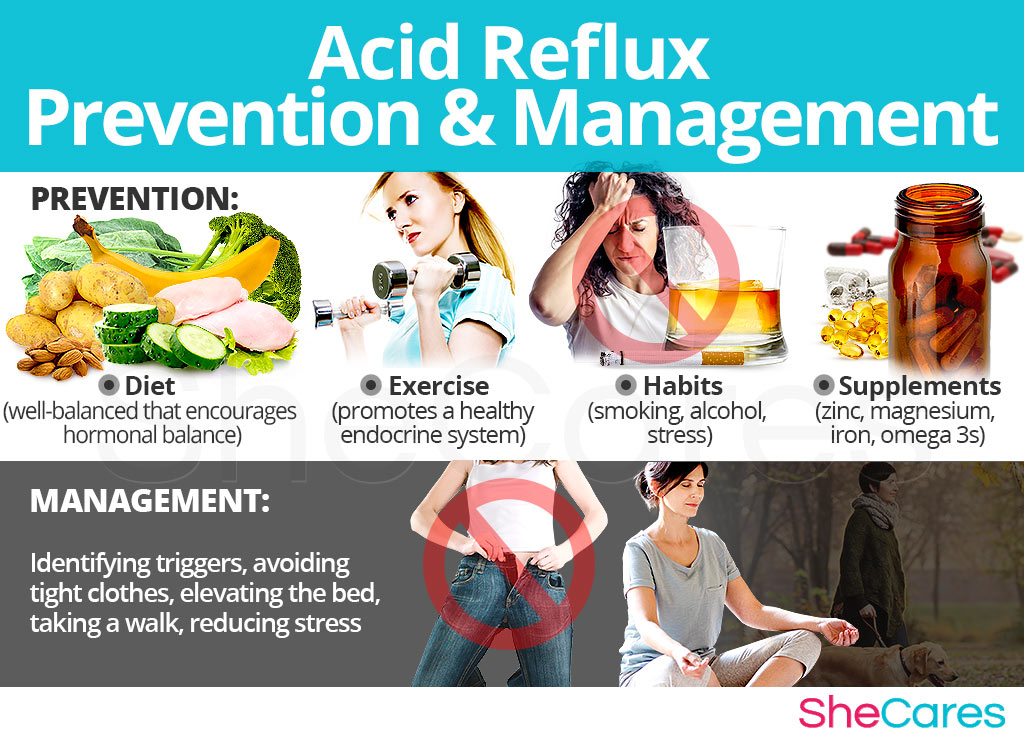
Treatments
Acid reflux can be uncomfortable for any woman who experiences it, and it can even damage her digestive tissue. In addition, when episodes of acid reflux interfere with daily life, it can progress to GERD. Fortunately, there are many effective treatments for acid reflux depending on the cause.
Three Approaches to Treat Acid Reflux
Three levels of approaches can be taken into account for treating acid reflux. These are categorized as: (1) Lifestyle Changes, (2) Alternative Medicine, and (3) Pharmaceutical and Surgical Options.
Women are urged to begin with the least risky approach to treating acid reflux - lifestyle changes - before proceeding to the next approach. While medical intervention is usually not necessary to treat acid reflux, it may be called for to address GERD. Women whose symptoms are not alleviated through lifestyle changes and alternative treatments may wish to consider pharmaceutical and surgical options after fully weighing the risks related to such treatment.
Lifestyle Changes for Acid Reflux
This primary approach to treatment entails the least amount of risk but the most self-discipline. Simple lifestyle adjustments can often make big improvements in acid reflux in addition to providing benefits to overall health. Essentially, an improved diet, regular exercise, and healthy habits can help relieve heartburn.
Though these lifestyle adjustments may help relieve the symptoms, they do not directly address hormonal imbalance that is the cause behind many instances of acid reflux. So, additional treatment may be needed. Alternative medicine has proven to be a great way of treating acid reflux connected to hormonal imbalance in a safe and natural way.
Alternative Medicine for Acid Reflux
Alternative medicines and supplements involve little to no risk and can be an extremely effective way to treat acid reflux, especially during times of hormonal fluctuation. In the case of herbal supplements, there are two main types that can be used: phytoestrogenic and hormone-regulating herbal supplements.
Phytoestrogenic herbal supplements
These supplements, such as black cohosh, contain estrogenic components produced by plants that complement the low estrogen hormones in a woman's body, helping alleviate acid reflux. By introducing plant-based estrogens into the body, these herbs treat an underlying estrogen deficiency that could be behind acid reflux.
They are mainly effective for menopausal women who are more likely to have low estrogen levels but are not necessarily effective for women in other stages of life, such as puberty.
Hormone-regulating herbal supplements
These supplements, including Macafem, stimulate the body's natural hormone production by nourishing the endocrine glands, helping them produce hormones more efficiently. This ultimately results in balancing not only estrogen, but also other important hormones, such as progesterone.
These supplements can be considered the safest and most natural way to treat the underlying hormonal imbalance behind acid reflux, and they can be taken throughout a woman's life as they support the body's natural hormone production.
Additionally, there are some other types of supplements that can also alleviate acid reflux or at least make them more manageable, including dietary and other herbal supplements.
A combination of approaches is usually the most effective route to take. For many women, lifestyle changes combined with alternative medicine is the best way to alleviate the symptoms of acid reflux. However, for others, the symptoms will be so severe that a more drastic treatment is necessary.
Pharmaceutical and Surgical Options for Acid Reflux
Interventions from the third approach involve the highest risk and often the most expense. Not all treatments are suitable for women at every life stage. So, it is strongly recommended to consult a licensed healthcare professional before starting any pharmaceutical treatments for acid reflux or GERD.
There are two main types of pharmaceutical options that can be prescribed to treat acid reflux as well as some surgical options for GERD. Medications typically include acid neutralizers, reducers, and inhibitors as well as drugs to strengthen the sphincter muscle.
These three approaches - lifestyle changes, alternative medicine, and medical intervention - are not mutually exclusive. A woman may use different approaches at different times or any combination of them, depending on the duration and severity of her symptoms. Today, more and more women find that dealing with acid reflux and its symptoms is best accomplished via a combination of healthy lifestyle and alternative treatments.
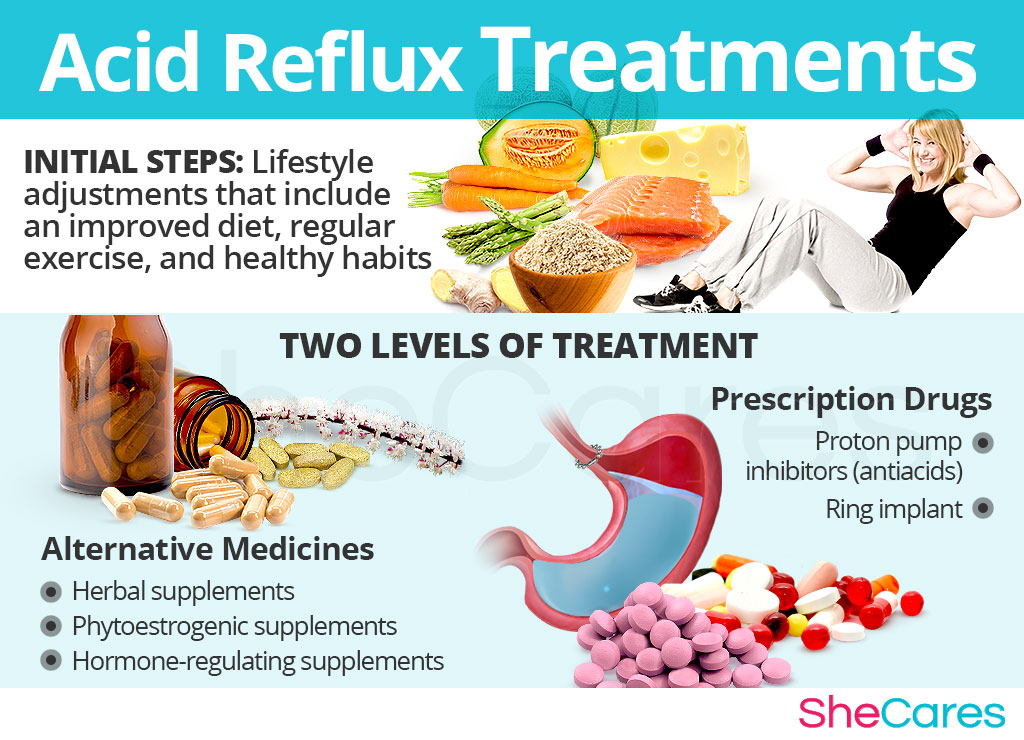
Sources
- Bielefeldt, K. , Waite, L. , Abboud, F.M. & Conklin, J.L. (1996). Nongenomic effects of progesterone on human intestinal smooth muscle cells. The American journal of physiology, 271(2 Pt 1), G370-376. Retrieved from http://www.ncbi.nlm.nih.gov/pubmed/8770053
- Fisher, R.S. , Roberts, G.S. , Grabowski, C.J. & Cohen, S. (1978). Inhibition of lower esophageal sphincter circular muscle by female sex hormones. The American journal of physiology, 234(3), E243-247. Retrieved from http://www.ncbi.nlm.nih.gov/pubmed/629338
- Infantino, M. (1998). The prevalence and pattern of gastroesophageal reflux symptoms in perimenopausal and menopausal women. Journal of the American Academy of Nurse Practitioners, 20(5), 266-272. doi: 10.1111/j.1745-7599.2008.00316.x.
- Six Tips for Avoiding Digestive Problems during Menopause. (n.d.). Retrieved August 6, 2013 from https://www.menopausenow.com/digestive-problems/articles/6-tips-for-avoiding-digestive-problems-during-menopause
- Del Rosario, J.D. & Cohen, M.B. (2011). Gastroesophageal reflux disease. Retrieved August 6, 2013 from http://kidshealth.org/PageManager.jsp?dn=American_Academy_of_Family_Physicians&lic=44&cat_id=20162&article_set=23077&tracking=T_RelatedArticle#
- Estrogen and Progesterone. (n.d.). Retrieved August 6, 2013 from http://www.whattoexpect.com/pregnancy/pregnancy-health/pregnancy-hormones/estrogen.aspx
- Gastroesophageal reflux disease. (n.d.). Retrieved August 6, 2013 from http://www.healthofchildren.com/G-H/Gastroesophageal-Reflux-Disease.html
- Li, J.T.C. (2013). Asthma and acid reflux: Are they linked? Retrieved August 6, 2013 from http://www.mayoclinic.com/health/asthma-and-acid-reflux/AN02116
- Madanick, R.D. & Katz, P.O. (2006). GERD and Pregnancy. Practical Gastroenterology, 30-39. Retrieved from www.practicalgastro.com/pdf/June06/MadanickArticle.pdf
- Mayo Clinic Staff. (2011). Barrett's Esophagus. Retrieved August 6, 2013 from http://www.mayoclinic.com/health/barretts-esophagus/HQ00312
- Mayo Clinic Staff. (2011). Esophagael Cancer. Retrieved August 6, 2013 from http://www.mayoclinic.com/health/esophageal-cancer/DS00500
- Mayo Clinic Staff. (2012). GERD. Retrieved August 6, 2013 from http://www.mayoclinic.com/health/gerd/DS00967
- Mayo Clinic Staff. (2011). Heartburn. Retrieved August 6, 2013 from http://www.mayoclinic.com/health/heartburn-gerd/DS00095
- Mayo Clinic Staff. (2012). Zollinger-Ellison syndrome. Retrieved August 6, 2013 from http://www.mayoclinic.com/health/zollinger-ellison-syndrome/DS00461
- NHS. (2012). Heartburn and gastro-oesophageal reflux disease. Retrieved August 6, 2013 from http://www.nhs.uk/Conditions/Gastroesophageal-reflux-disease/Pages/Introduction.aspx
- Rosenow III, E.C. (2011). Laryngospasm: What causes it? Retrieved August 6, 2013 from http://www.mayoclinic.com/health/laryngospasm/AN01215
- 10 Helpful Hints for Pregnancy, Labor and Postpartum. (2008). Retrieved August 6, 2013 from http://prenatalyogacenter.com/blog/10-helpful-hints-for-pregnancy-labor-and-postpartum/
